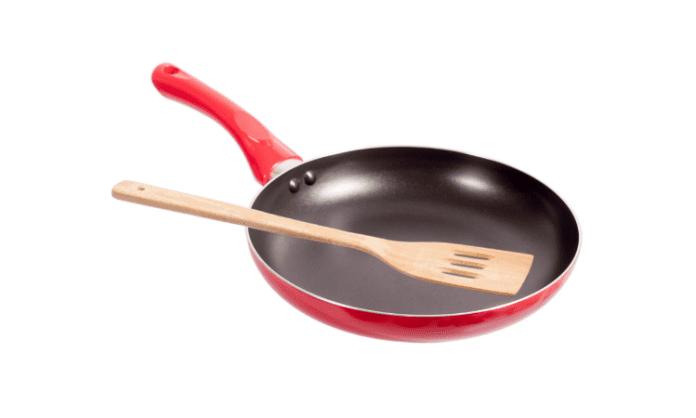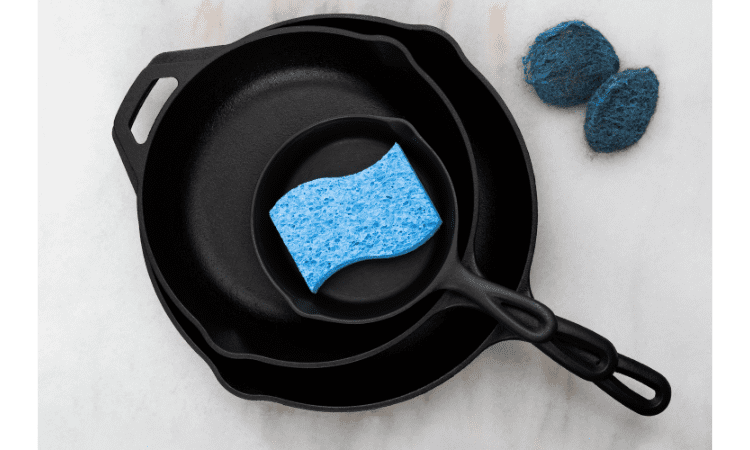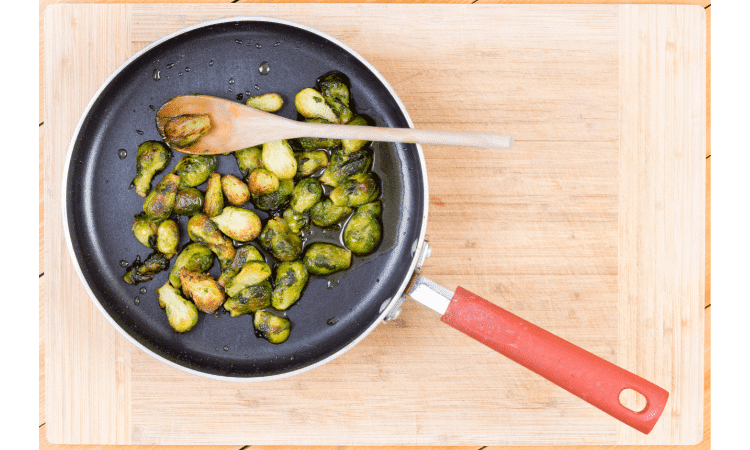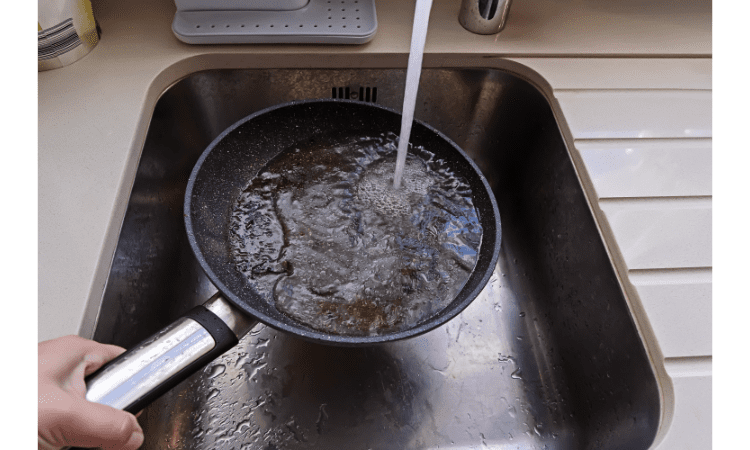
Nonstick cookware is a godsend when it comes to making cooking easier. You can use less oil and your food is less likely to stick to the pan. But the nonstick coating doesn’t last forever, and everything you do (or don’t do) will affect its lifespan. The good news is that there are several steps you can take that will help lengthen its life so you get the most out of your pans as possible.
Avoid using cooking spray

You might be tempted to use cooking spray on your nonstick cookware, but it’s better avoided. Cooking spray may cause the nonstick coating to peel or flake off, bubble, crack or even discolor. Cooking oil will do the same thing if you forget to wash it out of the pan after using it.
This is not just a problem for cheaper pots and pans—it can happen with high-end Teflon-coated cookware as well! If you find yourself in this situation and want to restore your pan anyway (or maybe there was just an oil spill), try cleaning the surface with mineral spirits first before giving up entirely on restoring its original look.
Heat them correctly

Using your nonstick cookware correctly can make a big difference in how long it lasts. The first step is to use the right heat setting. Never use high heat with nonstick pans, as it can cause them to warp and ruin their coating over time. Instead, opt for medium or low settings when cooking on your nonstick pots and pans; this way you can avoid overheating them, which will help extend their life span.
Season with cooking oil

Seasoning is a great way to keep your nonstick pans in good condition. If you are new to seasoning or simply want a refresher, here’s how:
- Season once every six months by applying cooking oil onto the surface of your pan and rubbing into the grooves. Use just enough oil so that it doesn’t pool at the bottom of your pan.
- Don’t use butter or margarine, as they don’t create an effective barrier against staining or sticking. Vegetable oils like canola, walnut and grape seed oil work best when seasoned with fresh herbs such as rosemary and thyme for extra flavor!
Clean them right

So, how do you clean your nonstick cookware? With the utmost care. The #1 rule of cleaning nonstick cookware is to use a soft sponge or cloth, and never anything abrasive. If you want to be extra cautious, we recommend using only a mild dish soap and warm water for cleaning, but many people like to use special cleaners designed specifically for nonstick surfaces.
The thing about these products is that they’re not all created equally—some are harsh and may wear down your pan faster than others! So if possible, stick with the gentler options: those that don’t contain any detergents (which can leave behind residue), silicone-based ingredients (that will also leave behind residue), or petroleum distillates (which can cause problems when heated).
If you’re unsure what kind of cleaner would work best for your specific situation or brand of cookware, check out our guide here!
Dry after every use

Drying is an essential step that helps to prevent rust and corrosion. It also prevents food from sticking to the pan, which can cause damage to the nonstick coating over time.
Dry your cookware immediately after each use by wiping it with a clean towel or paper towel, or washing it in the dishwasher if you have one. This will help prevent water spots from forming on your pans and make them easier to clean next time!
Avoid cooking acidic food

Cooking acidic food, like tomatoes and citrus fruits, can damage the nonstick coating. This is because these foods contain an acid that can cause the nonstick coating to flake off or turn white. This will happen when you use high heat to cook these foods and they start smoking or sizzling excessively. If you do have some of these types of dishes in your repertoire, it’s best to stick with low-to-medium heats when cooking them so as not to damage your pan.
Store them properly

To ensure that your nonstick cookware lasts as long as possible, store it in a dry place. You’ll want to make sure that there are no other pots or pans stacked on top of the one you’re storing to be sure that the weight doesn’t damage its surface.
Next, don’t use your pot or pan in the oven. While it may seem like a good idea for an extra-large pan to roast something in, this actually causes more wear and tear on both the pan and its nonstick coating.
Finally, do not store your pots or pans inside sinks full of water! This will cause rust spots from moisture seeping into cracks in the material while they sit there unused (and possibly forgotten).
Never store food in the pan

You should never store food in your pan. Many people make the mistake of storing their pans in the cabinet with other cookware, but this is not recommended. The first problem is that food can leave stains on the surface of your pan, which makes it look dirty and causes it to be more difficult to clean later on. The second problem is that food can also leave bacteria behind that can cause illness if you use these pans again without washing them properly first. Thirdly, some foods will leave odors behind when they’re stored in an unclean pan like vegetable oil or meat grease for example! Fourthly we have residue which may build up over time causing discoloration as well as sticking problems during cooking tasks; so always make sure you wash thoroughly after each use!
Allow to cool down before washing

- Allow it to cool before washing. Nonstick pans are made of metal and plastic, and when heated, they can become very hot. If you wash your pan while it is still hot, the heat will cause the oil in your hands to liquefy, making it easier for you to transfer grease from your fingertips onto the surface of your nonstick pan. This may result in stains on your pan that cannot be removed easily or at all. If you do not allow enough time for this residue to cool before washing it off with soap and water, there’s no telling what kind of damage could be done!
- Do not use a sponge or scrub pad (or anything else) with any sort of scrubbing action on its surface; this includes dishwarshers or scouring pads or steel wool pads/sponges/etcetera…
Avoid metal cooking spoons

It’s tempting to use metal cooking spoons when cooking with nonstick cookware, but you should avoid them. Metal can scratch the surface of your pans, which will cause them to wear out quicker and become less effective at preventing food from sticking.
If it’s necessary for you to use metal utensils on a regular basis (if you have an allergy or intolerance), there are some precautions that should be taken. First of all, don’t stir foods with a lot of acid in them: if they come into contact with certain metals (like aluminum), they’ll react negatively and cause discoloration or even corrosion of the pan. If you must use a metal spoon for these types of foods, make sure that it doesn’t have any rough edges; smooth out any sharp edges by rubbing sandpaper over them until they’re completely smooth and rounded off so as not to scratch your nonstick cookware coating when stirring or mixing ingredients together in the pan
Conclusion
Now you know how to keep your cookware in good shape. Investing in a good set of pans is always worth it, so take the time to maintain them well. It’s also important to follow basic safety practices when using nonstick pans, such as never putting a hot pan under cold water and making sure your pan has cooled down before washing it. If you have any other tips for extending the life of your cookware, let us know!











